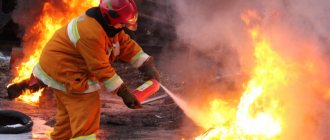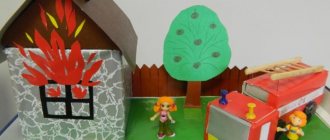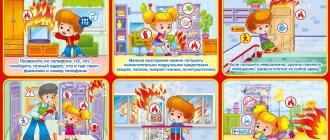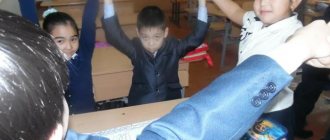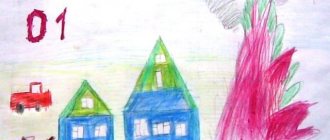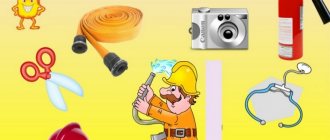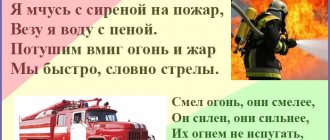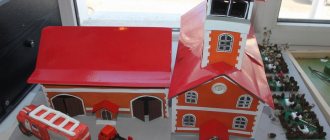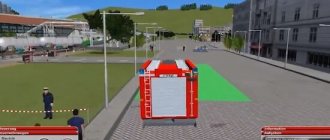Rules for children's behavior in case of fire
Teachers prepare a lesson on fire safety in the senior group in advance, thinking through materials and notes on behavior during a dangerous situation. According to the Federal State Educational Standard, during the conversation they must give answers to questions about handling matches, electronics, lighters, as well as an action plan during a fire both in kindergarten and at school.
How to behave during a fire
During the conversation, the guys will learn the sequence of actions in case of an emergency:
- If a fire occurs, immediately call 01 and give your address and last name. At this stage, many people often get lost, especially children. This comes from fear. The main thing in such a situation is to teach children self-control.
- Call adults: parents, neighbors. Even if the fire occurred due to the child’s fault, he must understand that he should not remain silent about it.
- Under no circumstances should you hide or let other children do this. Rescuers may not find them.
- If possible, run out of the building through the front door.
- If there is a balcony, and other paths are cut off by smoke or fire, you cannot jump from it. You need to go out into the air and close the doors, from there you need to loudly call for help.
- Another option is a window. Before opening it, close all the doors and plug the cracks (with rags, clothes, etc.), then lie down on the floor, closing the airways with a damp cloth.
Such rules are universal everywhere - at home, in kindergartens, at school.
"Don't play with fire"
Using examples of active and educational games, you can show preschoolers that games with matches, lighters and open fire are very dangerous. One of these could be the game “Cross it out - it’s dangerous!” Its essence is that cards with objects are written or attached on the board. Children need to cross out those that, if handled carelessly, can cause a fire.
For your information! Another active game on the theme “don’t play with fire” is “Dragon”. One “dragon” is selected, and the rest of the children dance around it and say: “We won’t have fires, the dragon won’t scare us.” When a sleeping dragon wakes up, it waves red ribbons (flames). Those who are touched by the ribbon leave the circle.
Rules of conduct in transport for school-age children
Fire safety rules for children
Every year, children under fourteen years of age are killed or seriously injured in fires and fires. The main reason can be called the dishonesty of parents, as well as the lack of knowledge and skills to behave in case of fire. To prevent fire safety, it is necessary to conduct lessons, conversations, and lectures.
It is recommended to consolidate the result with the help of games that help update the information received. Cartoons developed with the support of the Fire Service will help explain fire safety rules to young children (“Fire in the forest”, “Fire in the apartment”, “Rules of behavior for children in case of fire”).
Fire safety rules will be explained during life safety lessons, as well as during class hours on this topic. The use of poems by S. Marshak “Very, very important rules!”, “Song of Matches”, A. Usachev “Fire”, E. Gladkova “If there is a fire in the house” and others will help in this.
Basic fire safety rules for children
- You cannot play with matches, lighters, or match-candles;
- You cannot set fire to dry leaves, dry grass, trees, or poplar fluff;
- You cannot play with fireworks, sparklers, or firecrackers without adult supervision;
- You cannot use gasoline, kerosene and other flammable materials for gaming purposes;
- Do not throw bottles of deodorants, perfumes, air fresheners, etc. into a fire or set fire to them. This may result in an explosion and immediate fire;
- You cannot make a fire or play with an open fire indoors;
- You cannot make a fire in wooden sheds, dilapidated buildings, basements and attics;
- if there is a need for light, it is better to use a flashlight than matches;
About the fire - clearly
Bright pictures depicting burning appliances, furniture and toys will be a suitable visual aid for preschool children. They play games with them and ask riddles that will help the kids consolidate the material. The child guesses where a dangerous object (or a dangerous situation) is depicted and where it is not.
Cutting pictures
A didactic game where a whole drawing is assembled from cut pieces will appeal to younger children. Additionally, you can prepare coloring books, dotted drawings, or let the children themselves try to draw a picture on the topic of the lesson.
For open lessons in preparatory groups and primary classes, booklets are made where the topic is revealed in more seriousness and detail.
Fire safety conversation
During the conversation, you can use various works on the topic.
Short poems for children
The famous lines of K. Chukovsky “Confusion” well describe the danger of fire using the example of fairy-tale characters:
The sea is burning with flames. A whale ran out of the sea. -Hey, firefighters, run! Help! Help!
Example of a short poem
The teacher can also come up with small and easy to remember rhymes. Rhyming lines from children's poems can remain in memory even when the child grows up.
Be careful with fire. It is very important day after day. Once you give it free rein, it will immediately destroy our house. Destroying the grass, destroying the forest, He crawled into all the cracks. There is no one faster than the beast - the terrible one will leave his mark. So as not to anger the fire, we need to keep an eye on it.
Tales about fire safety
One of the popular fairy tales for fire safety classes in kindergarten is the familiar “Cat’s House” to many. They also stage skits or perform puppet shows based on it.
Important! A kindergarten employee can independently choose and read several short fairy tales, the life lesson of which is the danger of playing with fire.
Game “Call the Ministry of Emergency Situations”
Information is more easily absorbed by young children through play. The teacher can offer to act out a short scene where the scene will be the house where the fire started. The main thing is not to forget to remind children that a game is a game, and in life they need to act clearly and quickly, resorting to the rules that they have previously learned.
Call rescuers at number 01
During the game, children need to be taught composure. When a fire occurs, they often panic and rush to hide in a safer place - in a closet, under a bed, etc. During the game, preschoolers learn to act and get out of a dangerous place together.
Rules of behavior in nature for preschoolers
You can consolidate your knowledge with each of the children: in turn, they will have to depict or tell what to do if a fire starts in their house. The rest of the children learn from the example of others, and together with the teacher they sort out mistakes.
Note! Through play, the child learns the importance of remaining calm and disciplined.
It is also important to make it clear that in emergency situations the emergency phone number does not immediately come to mind, so you should keep a list of emergency numbers nearby. This could be notes on your phone, a piece of paper in a notebook, a bookmark in a book, etc.
To better perceive information, the game uses special props (toy phones, painted fire) or even an entire scene in the form of a room in which it looks like a fire has started.
Instructions for fire safety in preschool educational institutions
Basic instructions on fire safety measures in preschool educational institutions, fire safety instructions for administration, employees, procedures for action in case of fire, etc. are presented.
The head of the kindergarten is responsible for fire safety and fire protection in the preschool educational institution. He may, by order, appoint a person responsible for fire safety in the institution. It is mandatory that those in charge must develop instructions on fire safety measures in preschool educational institutions (kindergarten), as well as in warehouses, in the catering department, in the sports and music halls. download: Documentation on Fire Safety in Preschool Educational Institutions 38 documents taking into account laws as of September 8, 2022!
- Instructions on fire safety measures in preschool educational institutions
- Instructions on fire safety measures in the catering department of preschool educational institutions
- Instructions on fire safety measures in a food warehouse in a preschool educational institution
- Instructions on fire safety measures in the warehouse of inventory and goods and materials in preschool educational institutions
- Instructions on fire safety measures in the laundry room of a preschool educational institution
- Job description for fire safety of the head of a preschool educational institution
- Job description of the person responsible for fire safety
- Fire safety instructions for the duty administrator of a preschool educational institution
download: Regulations for preschool educational institutions 84 regulations in a package or individually. Update date: 10/06/2021
It is very important to bring to the knowledge of all kindergarten employees the provisions of the instructions on the procedure for maintaining and bringing the premises of the preschool educational institution to a fire-safe condition in order to prevent fires in classrooms and flooding.
Fire safety: reminder
The teacher’s goal is to explain all the rules of conduct in case of fire for children, a reminder about which must also be present. Posters with booklets and bright pictures should be hung in the preschool educational institution itself so that children can come up and study them at any time. These notes contain:
- rules for handling electrical appliances;
- algorithm for extinguishing small fires;
- instructions for using a fire extinguisher;
- information about available fire extinguishing methods.
Small cards - fire safety reminders for children
Fire safety instructions in kindergarten
Officials and employees of a preschool educational institution must clearly know the procedure for action in the event of a fire and evacuation in order to evacuate children in a timely and safe manner, notify the fire service and the head of the preschool educational institution in a timely manner, and take appropriate measures to extinguish the source of fire in the absence of a threat to life.
download: Job descriptions for preschool educational institutions (Profstandard) 31 instructions individually and in packages, updated - September 5, 2021!
- Fire safety instructions for preschool employees
- Instructions on the procedure for officials to act in the event of a fire in a preschool educational institution
- Instructions on the actions of personnel during evacuation in case of fire in a preschool educational institution
- Instructions on the procedure for maintaining and bringing premises of preschool educational institutions to a fire-safe condition
- Instructions for fire safety during mass events
- Fire safety instructions for New Year's events
- Fire safety rules for children in preschool educational institutions
- Fire safety rules for children at home
- Procedure for employees to evacuate in the event of a fire at a preschool educational institution
- Instructions on fire safety measures during repair work of preschool educational institutions
- Instructions on fire safety measures when carrying out painting work at preschool educational institutions
- Instructions for fire safety when carrying out hot work at preschool educational institutions
Spring and summer fire danger
During the warm period, the risk of fires increases significantly. Both the older and younger groups need to be told that in spring and summer, special attention should be paid to bonfires and other open fire, since any carelessness can cause a nearby thing or person to ignite. You cannot play with matches in the garden, or set fire to grass and branches for fun while walking.
Important! During the winter period, the main emphasis is on safety in the building, as well as during the New Year holidays.
Presentation for kindergarten
Material from the presentation
If possible, a presentation with an audio story, children's songs, cartoons and pre-acted scenes is prepared for preschoolers. This makes it much easier to provide information.
Children must understand that they should not play with fire, and in times of danger they should listen to the teacher. Every child should learn to be calm and not be afraid to call for help and help others. A well-conducted conversation will teach children fire safety rules on the street and at home.
Learn fire safety rules
Action plan for children of senior preschool age.
Our little fidgets are in a hurry to explore the world, not realizing the danger that it can bring. And we, adults, cannot always be there to help. That is why it is necessary to develop in children a conscious and responsible attitude towards personal safety and the safety of others. And in this sense, it is very important to introduce them to fire safety rules before school.
Every year we conduct a series of safety events in our kindergarten, the purpose of which is to develop in children the skills of careful handling of fire and an understanding of the need to comply with fire safety rules.
Tasks
- Give children initial information about the causes of a fire.
- Introduce the properties and qualities of objects in terms of their fire hazard.
- Give an idea of the work of firefighters and their professional actions.
- Teach children the rules of safe behavior in the event of a fire: be able to navigate the space of a group room, apartment, know the first actions in the event of a fire, be able to call the rescue service “01”.
- Develop a cautious attitude towards objects that are high sources of fire hazard.
- Foster respect for the firefighting profession.
- Foster a desire to provide mutual assistance and take care of your life and health.
The formation of the foundations of children’s life safety is carried out in different directions, the main ones being work with children, parents, teaching staff and staff. It is important not only to protect the child from danger, but also to prepare him to face possible difficulties, to form an understanding of the most dangerous situations, the need to take precautions, and to instill in him the skills of safe behavior in everyday life together with his parents, who act as role models for the child.
April
I. Methodological work
1. Work with children.
A. Organized educational activities:
- Reading fiction. Cognition. Safety. Communication. Reading the poem by S. Marshak “The Story of an Unknown Hero.”
- Cognition. Safety. Communication. Conversation “Why does a fire occur?”
- Cognition. Safety. Communication. Conversation “If there is a fire in the house.”
- Cognition. Work. Safety. Communication. Conversation “Firefighter is a heroic profession.”
- Cognition. Work. Communication. Excursion to the fire station. Introducing the fire truck.
- Artistic creativity. Cognition. Reading fiction. Safety. Communication. Drawing based on impressions from the work read and from the excursion. X Reading fiction. Cognition. Safety. Communication. Reading the work of S. Marshak “Cat’s House”.
- Work. Cognition. Socialization. Reading fiction. Communication. Joint activities with the teacher. Making masks for the dramatization game “Cat House”.
B. Independent activities of children:
- Physical Culture. Socialization. Health. Outdoor game “Who is faster?”
- Socialization. Cognition. Safety. Communication. Didactic game “Objects are sources of fire.”
- Socialization. Cognition. Safety. Communication. Role-playing game “We are firefighters.”
- Cognition. Socialization. Safety. Communication. Didactic game “What does a firefighter need?”
B. Cultural and leisure activities:
- An evening of entertainment. Cognition. Reading fiction. Safety. Communication. Dramatization game "Cat's House".
- An evening of entertainment. Cognition. Safety. Communication. Quiz "Fire is the enemy."
- Artistic creativity. Cognition. Safety. Communication. Drawing. Exhibition of children's works "Fire: friend or foe?"
2. Interaction with personnel.
- Thematic exhibition “Introducing fire safety rules to preschoolers.”
- Instruction “Protecting the life and health of children.” X Design of the “Service 01” stand.
II. Interaction with parents
- Consultation: “Personal safety of the child.”
May
I. Methodological work
1. Work with children.
A. Organized educational activities:
- Reading fiction. Cognition. Safety. Communication. Reading of E. Khorinsky’s poem “The Little Match.”
- Cognition. Safety. Socialization. Music. Reading fiction. Communication. “Matches are not for playing.”
- Cognition. Safety. Communication. Excursion to the laundry. Introduction to the operation of an electric iron.
- Cognition. Safety. Socialization. Reading fiction. Communication. “Don’t dry your pants over the gas after washing, otherwise your pants will leave holes!”
- Cognition. Safety. Communication. Conversation “So that there is no fire.”
- Cognition. Safety. Communication. Conversation “If there is a fire in the house. Phone 01.”
- Safety. Cognition. Socialization. Communication. Training games to develop children's safe behavior skills.
B. Independent activities of children:
- Safety. Cognition. Socialization. Communication. Didactic game “It burns - it doesn’t burn.”
- Physical Culture. Health. Socialization. Outdoor game "Fast and dexterous."
- Safety. Cognition. Socialization. Communication. Didactic game “What can’t be done in the absence of adults?”
- Socialization. Cognition. Safety. Communication. Role-playing game “We are firefighters.”
- Safety. Cognition. Socialization. Communication. Didactic game “In the world of dangerous objects.”
- Socialization. Cognition. Safety. Health. Communication. Role-playing game “Hospital” (providing first aid to a fire victim).
B. Cultural and leisure activities:
- Artistic creativity. Cognition. Safety. Communication. Drawing. Children's drawing competition "Fire is a friend, fire is an enemy."
- An evening of entertainment. Cognition. Safety. Communication. Quiz “Take care of your house from fire!”
2. Interaction with personnel.
- Thematic exhibition “Fire Safety”.
- Organization of a practical lesson “Evacuation of children in case of fire.”
II. Interaction with parents
- Consultation: “Rules of conduct and actions in fire conditions.”
- Design of a thematic exhibition (from joint works of students, parents and teachers) “Take care of nature from fire!”
Lidiya Glazkova, senior teacher of the MBDOU
“Kindergarten for general developmental type “Vasilyok”, r.p. Mullovka, Melekessky district, Ulyanovsk region
